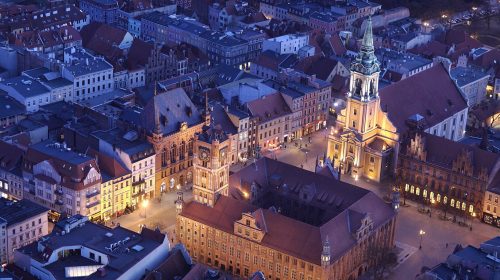Born on 3 March 1922 in one of the Gothic town houses built in the 13th Century in the Toruń Old Town, Kazimierz Serocki was one of the greatest figures of the 20th-Century Polish music – a brilliant composer of contemporary music and the author of film scores to some of the most-monumental works of the Polish cinema: Krzyżacy/Knights of the Teutonic Order, directed by Aleksander Ford, and Potop/The Deluge, directed by Jerzy Hoffman.
Mr Secorcki composed the soundtracks to fourteen feature films and approximately thirty shorts, both documentary and animated. It was he who, together with Tomasz Baird, created one of the most-important classical-music festivals in Poland – the Warsaw Autumn. The significance of his work is evidenced by the fact that to this day the Polish Society for Contemporary Music holds the annual Kazimierz Serocki International Composers’ Competition, addressed to young composers from around the world. Serocki started to write film scores in the early 1950s. In this regard, he was primarily interested in the compatibility of the soundtrack and the picture, and also the correlation between these two elements. Kazimierz Serocki claimed that the creation of a film score required close cooperation between the Director and the composer. He was able to accomplish his objectives to the fullest extent during his collaboration with Aleksander Ford. Together they created Młodość Chopina/The Youth of Chopin, Piątka z ulicy Barskiej/Five Boys from Barska Street, Krzyżacy/The Knights of the Teutonic Order, Ósmy dzień tygodnia/The Eighth Day of the Week, and Pierwszy dzień wolności/The First Day of Freedom. Ósmy dzień tygodnia, made in 1958, is considered to be their greatest achievement. This is where Serocki could “demonstrate his versatility and unorthodox character”. However, the picture – an adaptation of a short story by Marek Hłasko – was banned by the censorship authorities, and the Polish première took place 25 years later, in 1983. A lesser-known aspect of Serocki’s creative activity was his work in animated film. He composed the soundtracks to the flagship pictures of “the Polish school of animation”, of the late 1950s and early 1960s, such as the films directed by Jan Lenica, Julian Antonisz, Walerian Borowczyk and many other masters.
Selected filmography
- 1951 – „Młodość Chopina”/„The Youth of Chopin” dir. Aleksander Ford
- 1953 – „Piątka z ulicy Barskiej”/„Five Boys from Barska Street” dir. Aleksander Ford
- 1958 – „Ósmy dzień tygodnia”/„The Eighth Day of the Week” dir. Aleksander Ford
- 1960 – „Krzyżacy”/„The Knights of the Teutonic Order” dir. Aleksander Ford
- 1961 – „Przeciwko bogom”/„Against the Gods” dir. Hubert Drapella
- 1964 – „Pierwszy dzień wolności”/„The First Day of Freedom” dir. Aleksander Ford
- 1967 – „Koń”/„The Horse” dir. Witold Giersz
- 1970 – „Wspaniały marsz”/„The Splendid March” dir. Witold Giersz
- 1972 – „Kwadrat”/„The Square” dir. Zbigniew Rybczyński
- 1973–1974 – „Potop”/„The Deluge” dir. Jerzy Hoffman
- 1974 – „Ślady”/„Traces” dir. Witold Giersz
Selected awards and distinctions
The Lifetime Achievement award of the Minister of Culture and Arts: CHOPINA/THE YOUTH OF CHOPIN – State Award 2nd Class, etc.

